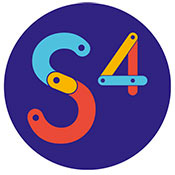What is racism?
Racism is a sensitive and often misunderstood issue. Oxford dictionary defines racism as
“Prejudice, discrimination, or antagonism directed against someone of a different race based on the belief that one’s own race is superior.”
Although this definition is not incorrect, it is an oversimplification of a far more complex and deep-rooted issue. This definition focuses on individual bias and prejudices, overlooking the institutionalised and systemic nature of racism which affects all aspects of a world built through colonialism & white privilege.
Our policy
All of S4’s participants and staff have the right to be treated with respect regardless of their ethnic and religious identity. No individual should feel unsafe or mistreated due to their cultural or racial identity and should feel free to be able to fully express themselves without the risk of discrimination or prejudice. We recognise that race is a protected characteristic under the Equality Act 2010. This means it is against the law to discriminate against someone based on their race. This applies equally to educational settings, and workplaces.
We at the S4 project do not tolerate any individual being intentionally offensive or hostile towards another on the grounds of their racial or ethnic origin, or any incitement to commit such an act in such a manner:
What does racism look like?
Racial abuse takes many forms including verbal abuse, physical abuse, online bullying, and active exclusion from activities. Verbal abuse is often the most common form of racial abuse; for example the use of racist terminology or stereotypes.
Understanding this and recognising the main modes of racial abuse is vital to tackle racism in the classroom. Language is a powerful tool for developing world views, and the words and terminology children are exposed to highly influence their perception of themselves and others.
Procedures/implementation
Role of staff
No member of staff should ignore racist behaviour, be it toward participants or fellow staff. No racist behaviour of any kind is acceptable. Staff who witness or hear any concerning behaviour from participants or staff should report it to their Line Manager.
Any instances of racial abuse observed between participants will also be passed onto to the teachers present that day so the incident can be dealt with in line with the school’s own procedures.
Role of participants
All our S4 participants should adhere to our class rules which include treating others with respect.
If any participant feels they are being mistreated by others due to their race they should report it to an adult in charge.
Any participants who witness incidents of racism towards another should also report this behaviour to an adult in charge.
Participants should not try to diffuse or handle the situation themselves, or alone, nor should they retaliate. Participants should always to go a staff member or adult for help with the matter.
It is essential that we all work to address issues of race and equality within education, and in our day to day lives. There are many strategies we as S4 staff members can adopt within the classroom to help support educators as they approach issues of racism with children.
This should form the foundation of good practice as we make efforts to remove racial prejudices from the classroom. This template will be under continuous review and revision as we grow and learn more about systemic racism in UK education and classrooms.
We want to work closely with our schools to tackle this issue and have compiled a list of resources for anti-racism education. These resources can be found here
